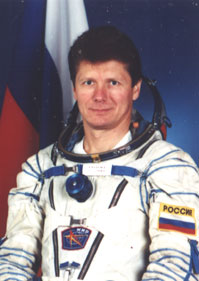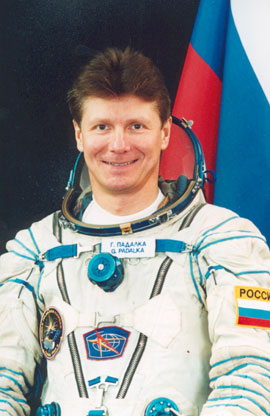

| Gennady Ivanovich Padalka |  |
|
|
| RSC Energia bio |  Gennady
Ivanovich PADALKA Gennady
Ivanovich PADALKA
ISS Commander
DATE AND PLACE OF BIRTH: June 21, 1958, Krasnodar, RSFSR (Russia).
EDUCATION: In 1979 he graduated from Eisk Higher Military Pilot School after V.M. Komarov. In 1994 after training at the International Center of Training Systems he got a qualification of engineer-ecologist and a degree of Master of ecological monitoring. FAMILY STATUS: Married.
AWARDS AND RANKS:
WORK EXPERIENCE:
|
| RSC
Energia bio
(Apr 02) |
 Gennady
Ivanovich PADALKA Gennady
Ivanovich PADALKA
Crew Commander of the Soyuz TM-34 Spacecraft,
DATE AND PLACE OF BIRTH: June 21, 1958, Krasnodar, RSFSR (Russia).
EDUCATION: In 1979 he graduated from Eisk Higher Military Pilot School after V.M. Komarov. In 1994 after training at the International Center of Training Systems, UNESCO, he got a qualification of engineer-ecologist and a degree of Master of ecological monitoring. FAMILY STATUS: Married.
AWARDS AND RANKS:
HOBBY: sports games, diving, running, badminton, parachute-jumping, theatre. WORK EXPERIENCE:
April 2002.
|
| RSC
Energia bio
(Mar 04) |
 Gennady
Ivanovich PADALKA Gennady
Ivanovich PADALKA
ISS Commander,
DATE AND PLACE OF BIRTH: June 21, 1958, Krasnodar, RSFSR (Russia).
EDUCATION: In 1979 he graduated from Eisk Higher Military Pilot School after V.M. Komarov. In 1994 after training at the International Center of Training Systems he got a qualification of engineer-ecologist and a degree of Master of ecological monitoring. FAMILY STATUS: Married.
AWARDS AND RANKS:
WORK EXPERIENCE:
March 2004.
|
| RSC Energia bio
(Sep 08) |
 Gennady
Ivanovich PADALKA Gennady
Ivanovich PADALKA
ISS Commander,
DATE AND PLACE OF BIRTH: June 21, 1958, Krasnodar, RSFSR (Russia).
EDUCATION: In 1979 he graduated from Eisk Higher Military Pilot School after V.M. Komarov. In 1994 after training at the International Center of Training Systems he got a qualification of engineer-ecologist and a degree of Master of ecological monitoring. FAMILY STATUS: Married.
AWARDS AND RANKS:
HOBBY:
WORK EXPERIENCE:
September 2008.
|
| RCS
Energia bio
(Mar 09) |
 Gennady
Ivanovich PADALKA Gennady
Ivanovich PADALKA
ISS Commander,
DATE AND PLACE OF BIRTH: June 21, 1958, Krasnodar, RSFSR (Russia).
EDUCATION: In 1979 he graduated from Eisk Higher Military Pilot School after V.M. Komarov. In 1994 after training at the International Center of Training Systems he got a qualification of engineer-ecologist and a degree of Master of ecological monitoring. FAMILY STATUS: Married.
AWARDS AND RANKS:
HOBBY:
WORK EXPERIENCE:
March 2009.
|
|